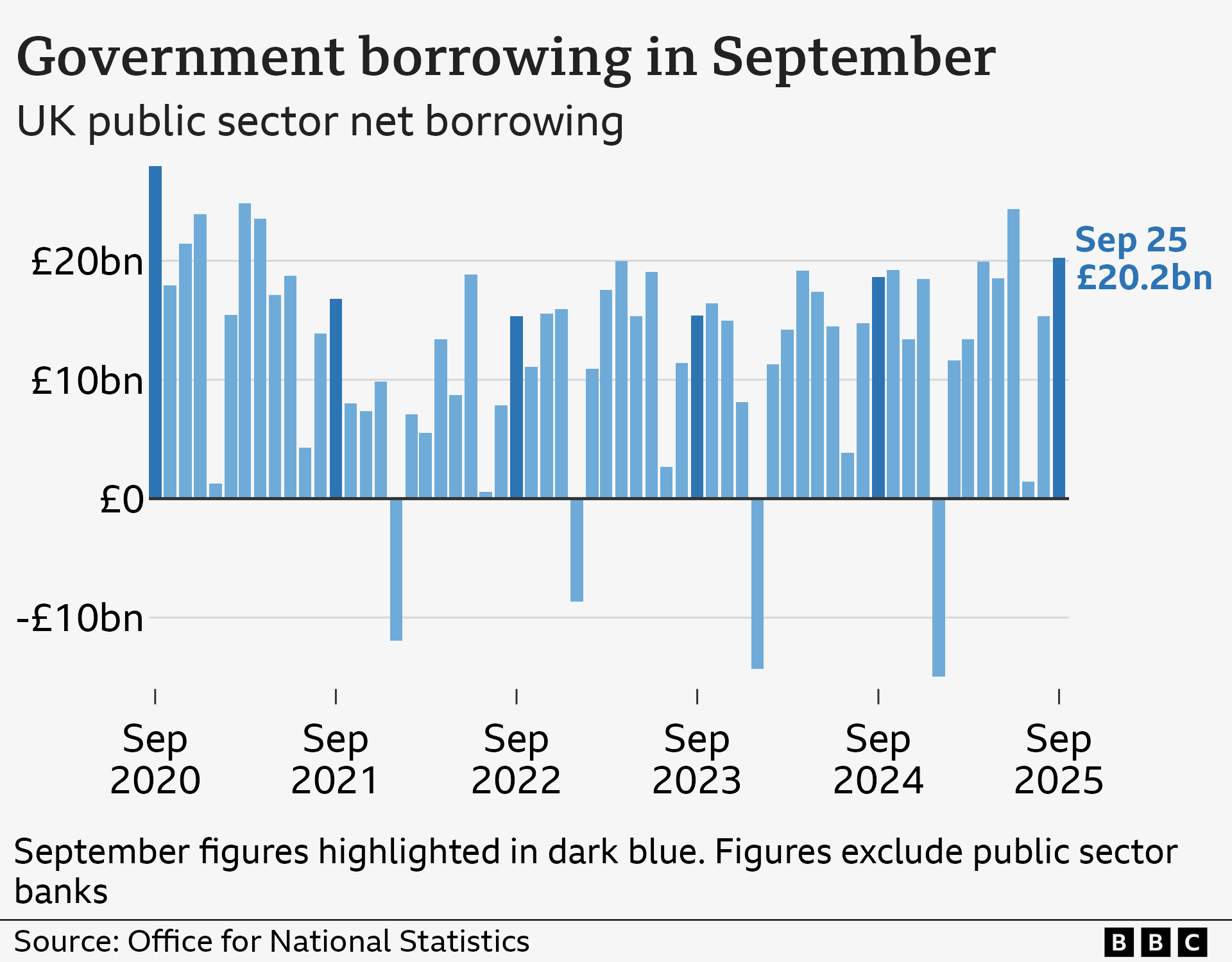Highest government borrowing in September for five years

- Published
UK government borrowing in September hit the highest level for the month in five years, official figures show, highlighting the challenges facing the chancellor ahead of next month's Budget.
Borrowing - the difference between public spending and tax income - was £20.2bn in September, up £1.6bn from the same month last year, the Office for National Statistics (ONS) said.
A rise in debt interest payments offset the increased amount the government had raised through tax and national insurance, the ONS said.
Chancellor Rachel Reeves is widely expected to raise taxes in November's Budget in order to meet her self-imposed rules for government finances.
September's figure was slightly less than analysts' expectations of £20.8bn, but was just above the £20.1bn that had been projected by the government's official forecaster, the Office for Budget Responsibility (OBR), in March.
Borrowing over the first six months of the financial year has now reached £99.8bn, which the ONS said, external was the second-highest total for that period since monthly records began in 1993, after that of 2020. It is also £7.2bn more than the amount the OBR had predicted.
The OBR is set to update its forecasts next month - laying out how much of a shortfall the government will need to make up if it is to meet its own tax and spending rules by the end of the current parliament.
Speaking to the BBC's Today programme, Capital Economics chief economist Paul Dales said the chancellor would "love tax receipts to be higher" but that it would depend on faster growth in the economy.
Capital Economics is projecting that the government will have to raise £27bn in the Budget, with "higher taxes on households having to do the heavy lifting".
Nick Ridpath, research economist at the Institute for Fiscal Studies, also pointed out the challenges facing the chancellor, citing "high debt interest spending, tiny headroom and a looming productivity downgrade" as factors that could make things "even trickier".
While the focus remains on what measures the chancellor might take in the Budget, on the financial markets UK government borrowing costs have been easing over the past couple of months.
In August, long-term borrowing costs reached their highest level since 1998, when the interest rate on 30-year government bonds, known as the yield, jumped to 5.7%. However, this has now fallen to below 5.3%.
The yield on 10-year UK government bonds - usually taken as the benchmark for the cost of borrowing - is now at about 4.5%, down from a 4.8% in August.
Ahead of the Budget, the government has announced a number of measures it is taking to try to boost economic growth.
At the Regional Investment Summit in Birmingham on Tuesday, Reeves will announce reforms to scrap paperwork and red tape, which she says will save companies almost £6bn a year.

The ONS figures showed that although tax income in September was higher than last year, in part due to the increase in employers' national insurance contributions, spending also increased.
This was partly due to pay rises and inflation increasing the government's day-to-day running costs, as well as inflation-linked increases to state benefits.
The government also had to pay £9.7bn in debt interest, which was up by £3.8bn from the same month last year.
Public sector debt in the UK is now estimated to be at 95.3% of gross domestic product (GDP) and remains at levels not seen since the early 1960s.
Responding to the figures, Chief Secretary to the Treasury James Murray said the government would "never play fast and loose with the public finances".
He reiterated the government's aim of bringing down borrowing, to be rid of "costly debt interest, instead putting that money into our NHS, schools and police".
But shadow chancellor Mel Stride said that borrowing was "soaring under this Labour government".
"Rachel Reeves has lost control of the public finances and the next generation are being saddled with Labour's debts," he said.
Liberal Democrat Treasury spokeswoman Daisy Cooper said "alarm bells should be ringing for the government ahead of the Budget".
She said the Conservatives had left the economy in "a terrible state" but that "this government has made mistake after mistake, failing to get our economy growing again".
The new figures from the ONS include a correction to earlier data, when an error had been made in how VAT receipts had been added.
Related topics
- Published21 October
